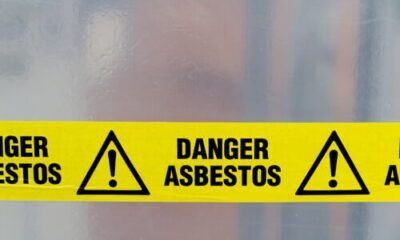

Editors Choice
Common Environmental Mistakes That Lead To Expensive EPA Fines
The Environmental Protection Agency is very tough on people that violate environmental laws. In 2017, the EPA imposed $2.98 billion in fines on organizations and individuals that committed environmental crimes.
The EPA uses these laws to protect the country from the negative externalities of pollution. While they serve a very valid purpose, it can be serious burden on well-meaning companies that unwittingly violate environmental regulations and get fined as a result.
Fortunately, you can significantly reduce the likelihood that you will be fined by the EPA or your state environmental regulator. The best place to start is by knowing which fines are most common and taking the right precautions to avoid them. Here are some of the most common reasons companies get fined by the EPA.
Not dealing with asbestos properly
The clean air act has strict policies on handling asbestos. Here are some things that you need to be aware of:
- You cannot handle or try removing asbestos on your own. You need to use staff that are certified and properly trained to work with that. This is the biggest mistake that businesses make, because they don’t realize how carefully regulated asbestos is.
- You must always notify the EPA before trying to remove asbestos. They need to keep careful records and make sure the project is handled properly.
- Failing to receive a Title V permit to operate any facility with asbestos in it.
- Disposing of asbestos in a dangerous way or any manner that does not comply with EPA standards.
- Neglecting to keep necessary documentation of your asbestos removal project. If you properly disclosed the details ahead of time, then the EPA is likely to perform an inspection.
The fines for not handling it properly can be severe. One man was sentenced to 24 months in probation and ordered to pay $3000 fine.
Failing to properly dispose of waste water
Almost all businesses accumulate waste water over time. The volume of waste water that some businesses accumulate is much higher than others. Restaurants, car wash facilities, factories and agricultural businesses tend to use it the most.
Since you have to get rid of it so often, it is often tempting to take shortcuts. Unfortunately, failing to dispose of waste water correctly will be a violation of the Clean Water Act.
Here are some general guidelines to make sure that your business is in compliance with the Clean Water Act:
- Know what types of water can be disposed of threw a floor drain.
- Always get the necessary permits to discharge waste water.
- Have on-site secondary waste storage units as a backup.
- Know which types of chemicals cannot be disposed of through drains. You may need to have a filtration system in place.
- Make sure that you have a Stormwater prevention plan and spill prevention plan in place. It is an EPA violation not to have the safeguards in place, even if you never end up using them.
The Clean Water Act is one of the most frequently and forced EPA regulations. Make sure that you are familiar with the policies. You can reduce the risks of being fined by using an RCM expert. Click here if you are asking yourself: “what does RCM stand for?”
Toxic Chemical Act
The standards under the Toxic Chemical Act are the most well-known. However, many businesses don’t know what measures they should take to avoid being cited by the EPA.
The first thing that you should now is that you must always disclose the presence of harmful chemicals to any tenants are people on your property. This includes lead-based paint. You can’t just assume that people know that there must be lead-based paint on your property simply because it is old. You must explicitly tell them.
You also cannot work with PCBs on your own. This is another substance that should only be handled by a certified expert.
Finally, if you store oil on any of your properties, there are very extensive regulations on making sure that spillage is minimal and that the storage units are located far away from water supplies. The details are too expensive to list here, but you should at least look into them.
Learn the different EPA regulations and make sure you are in compliance
Complying with EPA regulations is very important. You must take all steps to avoid being fined. Fortunately, the chances of being fined fall sharply if you take these precautions.


 Features11 months ago
Features11 months agoEco-Friendly Cryptocurrencies: Sustainable Investment Choices

 Energy11 months ago
Energy11 months agoThe Growing Role of Solar Panels in Ireland’s Energy Future

 Energy10 months ago
Energy10 months agoGrowth of Solar Power in Dublin: A Sustainable Revolution

 Energy10 months ago
Energy10 months agoRenewable Energy Adoption Can Combat Climate Change




























